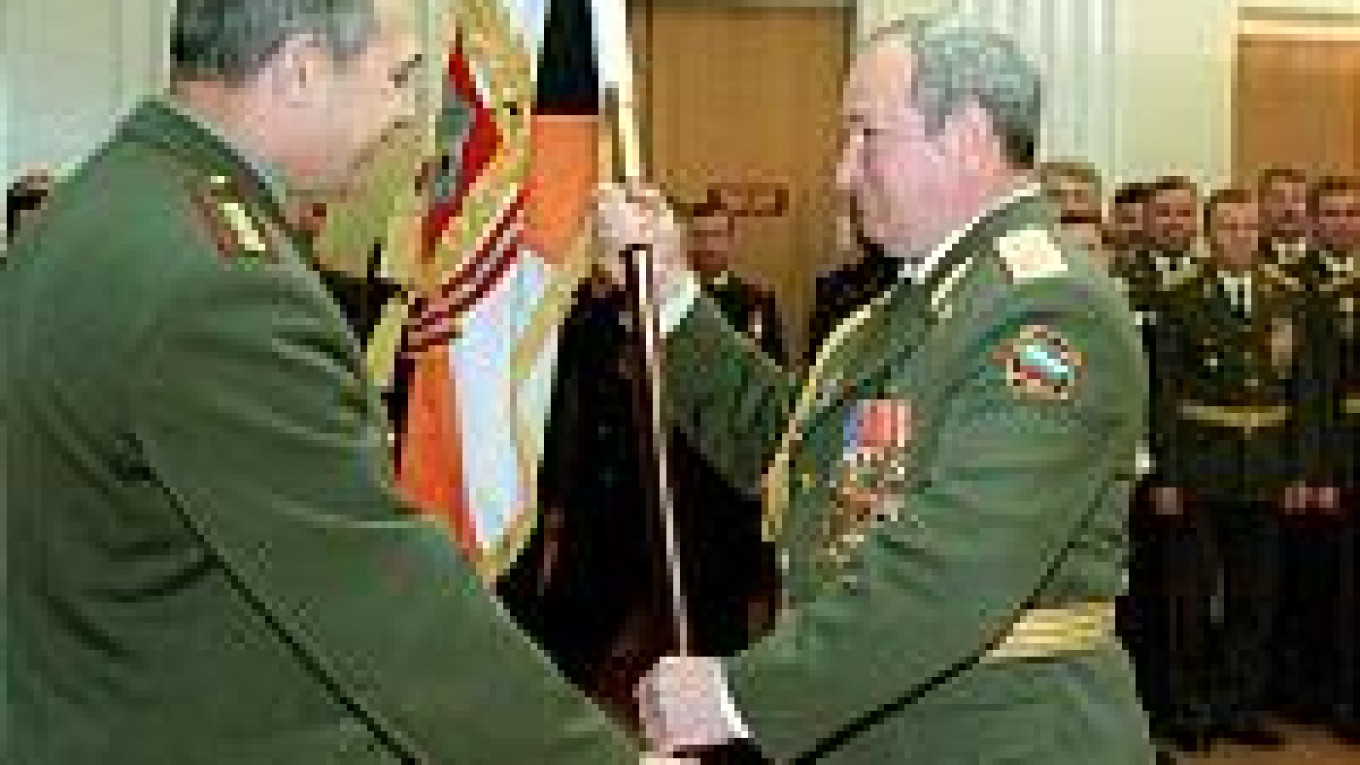Putin signed a decree removing Troshev from his post after the colonel general was shown on national television defying Defense Minister Sergei Ivanov's "offer" to accept command of the Siberian Military District.
Putin "values" Troshev's conduct as commander of the North Caucasus Military District, which has borne the brunt of the two military campaigns in Chechnya, said a statement released by the presidential press service Wednesday evening. However, the president has found "public discussions of the decisions made by the leadership of the armed forces unacceptable," it said.
The commander of the Siberian district, Vladimir Boldyrev, will take over from Troshev, the statement said. It will be decided in the next few days whether Troshev will continue his active military service in a new assignment or be discharged, Interfax reported, citing a source in the Defense Ministry. Ivanov will take Troshev's opinion into account in making his decision, the source said.
Troshev angered Ivanov by publicly spurning his offer to swap posts with the Siberian commander, which would effectively have been a demotion for the veteran of both Chechnya campaigns.
In an interview broadcast Tuesday night, Troshev said "it is not time for such castling" and pointed out that the Siberian district has one-third the number of combat-ready troops even though it has the largest territory among Russia's six military districts. It also remains below the radar of the national media, especially when compared to the North Caucasus district.
Ivanov responded to Troshev's pronouncement by asking Putin to fire him, since only the commander in chief can fire such a senior military official.
Ivanov, a retired foreign intelligence officer who is close to Putin, has been seen by some in the defense establishment as an ineffective defense minister. And Russian papers have speculated for months that Anatoly Kvashnin, chief of the General Staff, who effectively controls the daily life of the Russian armed forces, is seeking to sideline him.
Perhaps to head off further talk of a rift within the military, Putin's spokesman on Chechnya, Sergei Yastrzhembsky, made a point of saying the decision to reassign Troshev was made jointly by Ivanov and Kvashnin. Troshev has been considered Kvashnin's man.
The first report of the defense minister's intention to rotate the command of the two military districts emerged last week in Nezavisimaya Gazeta, which lamented the planned "exile in Siberia" of the combat general and quoted anonymous sources in the Defense Ministry as saying that Boldyrev had already agreed to the "castling."
The report generated no response or official announcement, however, until Troshev decided to go public. His appearance drew immediate fire from the Defense Ministry, Kremlin and State Duma.
Paradoxically, the high-profile ouster will only help to propel the career of the 57-year-old Troshev, who would otherwise have had to spend the few remaining years of his active military service in Chita, a political backwater more than 6,000 kilometers east of Moscow.
The ouster opens up a "vast field of political opportunities" for the outspoken general, who has gained both stars on his epaulets and popularity during his stint in the North Caucasus, according to one of Russia's leading independent military experts, Vitaly Shlykov. Troshev even has enough political weight to run for president, according to Shlykov, who once served as deputy defense minister.
According to Aslanbek Aslakhanov, who represents Chechnya in the State Duma, and Union of Right Forces leader Boris Nemtsov, however, Troshev is more likely to run for the post of Chechen president as he is a native of its capital, Grozny. Aslakhanov said the idea has been discussed with Troshev, who did not rule it out.
Troshev has made no public on his plans, although he once criticized a commander who quit the armed forces to run for governor.
Two years ago, Troshev described the decision by his subordinate General Vladimir Shamanov to run for governor of the Ulyanovsk region as a "betrayal." Shamanov won that seat in December 2000, and it was later reported that he quit over an "offer" to be transferred to the Interior Troops, which are both less capable and prestigious than Defense Ministry troops.
In addition to Shamanov, at least several other top commanders have refused new assignments and then pursued a political career. These include deputy chief of the army Eduard Vorobyov, who refused in December 1994 to assume command of the federal troops entering Chechnya and later became a member of the State Duma. Colonel General Viktor Kazantsev, who had commanded the North Caucasus district before Troshev, declined transfer to the Military Academy of the General Staff in spring 2000 and became Putin's envoy to the Southern Federal District.
 ? Yastrzhembsky dismissed a call by the Duma for a state of emergency in Chechnya to help prevent abuses against civilians by troops stationed there, wire services reported. Imposing a state of emergency, as suggested by lawmakers on Tuesday in a unanimous vote, would pull the rug from under official claims that life in Chechnya is back to normal.
? Yastrzhembsky dismissed a call by the Duma for a state of emergency in Chechnya to help prevent abuses against civilians by troops stationed there, wire services reported. Imposing a state of emergency, as suggested by lawmakers on Tuesday in a unanimous vote, would pull the rug from under official claims that life in Chechnya is back to normal.Yastrzhembsky, speaking on Ekho Moskvy, also said that officers who break the law in Chechnya should be prosecuted and punished. "This also applies to Colonel Yury Budanov. If Budanov is guilty, he must be punished."
A Message from The Moscow Times:
Dear readers,
We are facing unprecedented challenges. Russia's Prosecutor General's Office has designated The Moscow Times as an "undesirable" organization, criminalizing our work and putting our staff at risk of prosecution. This follows our earlier unjust labeling as a "foreign agent."
These actions are direct attempts to silence independent journalism in Russia. The authorities claim our work "discredits the decisions of the Russian leadership." We see things differently: we strive to provide accurate, unbiased reporting on Russia.
We, the journalists of The Moscow Times, refuse to be silenced. But to continue our work, we need your help.
Your support, no matter how small, makes a world of difference. If you can, please support us monthly starting from just $2. It's quick to set up, and every contribution makes a significant impact.
By supporting The Moscow Times, you're defending open, independent journalism in the face of repression. Thank you for standing with us.
Remind me later.


